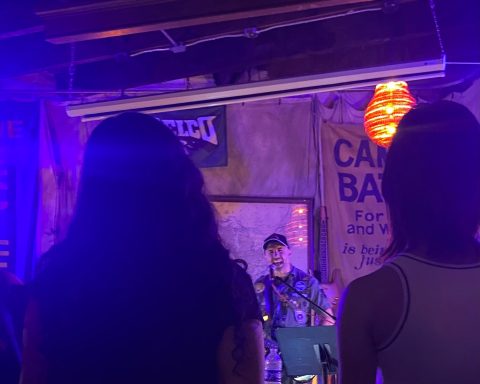Editor’s note: This article was initially published in The Daily Gazette, Swarthmore’s online, daily newspaper founded in Fall 1996. As of Fall 2018, the DG has merged with The Phoenix. See the about page to read more about the DG.
“I think that historical-based Shakespeare has almost no place in the theater world […] It’s a museum piece, not theater. It attempts to do nothing but recreate something that’s already been,” said Josh McLucas ‘15, director of Titus Andronicus.
Very little of the staging of the play could be considered traditional. The show was held on the main stage of LPAC where temporary seating was placed on the stage itself, minimizing the space between the audience and performers. As people approached the door, mock-protesters began chanting, “no knives, no fists, no Titus Andronicus.” Theater-goers were then led in, one by one, to the dark room where unsettling, ambient noise was playing.
The production emerged out of McLucas’ desire to do something by Shakespeare.
“I reread most of [Shakespeare’s] lesser known works […] because a lot of the well-known ones have been done recently here. Titus is so explicit and frank about all of its subjects – about violence, gender, and race – in terms of not hiding anything in a way that other plays by Shakespeare don’t,” McLucas said. “There was a depth to it I was surprised by, and it made me want to go further with it.”
“Titus is not considered to be one of Shakespeare’s better written plays, but it has a really interesting plot. A lot of the play is attempting to understand societal complicity in certain types of violence, and it was a good play to really explore those things,” said Treasure Tinsley ‘15, the assistant director and stage manager for the play.

McLucas in particular was struck by the way the play paralleled modern political issues.
“I was in a class, Anthropology of Mass Media, where we were talking about the Abu Ghraib abuse scandal and something clicked, where I knew that was the context in which this play could completely work, every word of it, without changing a thing,” McLucas said.
However, there were several changes made for this production to make it more contemporary and accessible.
“The play itself is set in a nondescript military prison type setting in the modern day. Our Lavinia is female to male transgender – if you look at statistics, transgender people are more likely to get raped, so there was that playing into that decision. […] There are also some subtle remarks on [which characters] understand to refer to Lavinia with the proper pronouns throughout the show,” Tinsley said.
Furthermore, the play decided to combine the characters of Aaron and Saturninus.
“Originally it was a logistical issue […] but then I thought to combine the roles into two halves of the personality of one person. [Aaron] presents as Saturninus in the Rome context as a facade,” McLucas said.
However, this choice led to complications within the plot of the play that had to be resolved.
“We’ve justified it through a whole range of things that no one in the audience will ever know, but there is logic in how the character of Aaron knew to become Saturninus. It’s been really interesting and really difficult for it to make sense within the context of everything else that’s going on,” McLucas said.
The use of modern technology was also integrated into the production, with different characters using video cameras to record distinct events.
“There’s this great scene at the end of the show where, after a bunch of people have died, a character who is supposed to be a young boy pans over the audience with a video camera after having video taped all of this violence,” Tinsley said. This scene serves as just one of the choices made to call attention to the real world implications of this absurd violence.
In terms of the final product, McLucas stated that he felt the production had met his personal barometer for success.
“For this play, if I get this really sickening feeling of guilt and question why I don’t just jump up and start a protest, then I know we’re doing the right thing,” McLucas said.













